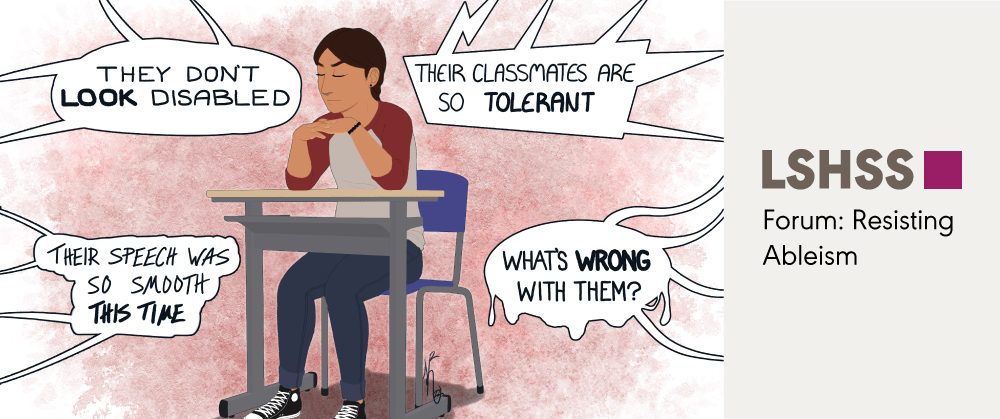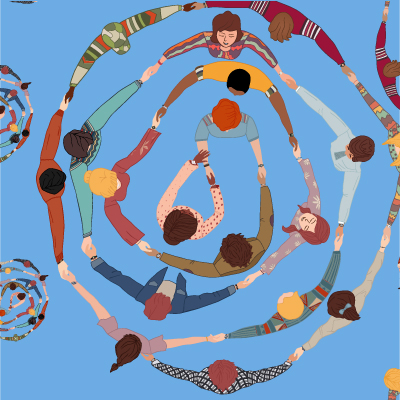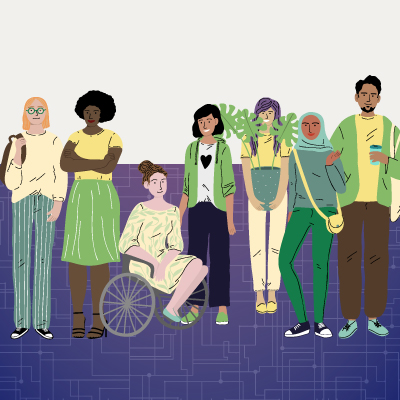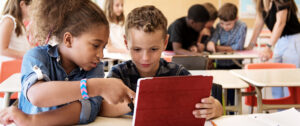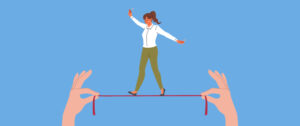The beginning of the year is an important time to reflect on how we can do better for ourselves and others. A new forum in Language, Speech, and Hearing Services in Schools (LSHSS) suggests that speech-language pathologists (SLPs) can do just that by “Resisting Ableism in School-Based Speech-Language Services.”
Guest editors Laura DeThorne and Hope Gerlach-Houck write that resisting ableism is particularly challenging when “we are bombarded by both direct and indirect messages of what it means to be ‘normal’ or not normal” (DeThorne & Gerlach-Houck, 2023, p. 2). The articles in the forum can help school-based SLPs navigate existing school structures, cultivate positive neurodivergent identities, and rethink their roles as SLPs.
Navigating Existing School Structures
After an introduction by DeThorne and Gerlach-Houck, the next two articles focus on ways that SLPs can work within existing structures. These articles focus on disability- and neurodivergent-affirming practices and methods, including incorporating the perspectives of children with diverse needs.
First, Reeves and colleagues highlight practical guidelines and specific examples of how to include disability-affirming practices in stuttering therapy. Next, Yu and Sterponi highlight conversation analysis as a way to assess social communication by analyzing the everyday social actions of autistic children.
Cultivating a Positive Neurodivergent Identity
Four articles highlight how the SLP can help autistic students and students who stutter cultivate a positive neurodivergent identity. Constantino summarizes research about identity development in stuttering and discusses his own approach, using a case study of a 12-year-old boy to show these methods in action.
The next article by Vidal et al. shows how everything from cultural views to classroom materials shape peer interactions for a minimally verbal autistic child. The authors offer specific examples of how environmental elements can be modified to improve the social experience of autistic students.
Then, Daniels et al. explore the intersection of stuttering and lesbian, gay, bisexual, and transgender (LGBT) identities and the role that these identities play in individuals’ psychosocial experiences. Next, Gerlach-Houck et al. discuss students who conceal their stuttering in school—and how SLPs can help offer safer environments for all students who stutter.
Rethinking Our Role as SLPs
The final three articles in the forum ask SLPs to rethink their role as service providers and to consider the role that the professions have historically played. Sisskin offers suggestions and asks clinicians to reenvision how they talk about stuttering, think about therapy, and mold school culture—with the goal of creating an environment that is more affirming for neurodivergent students.
A tutorial by Santhanam shows clinicians how they can incorporate videogaming to offer students a neurodiverse-affirming social support network that integrates non-autistic peers. Then, Donaldson et al. offer suggestions from autistic creators on how SLPs can expand access to augmentative and alternative communication (AAC) and promote individual agency.
An Invitation to Change
The forum ends with an epilogue by Gerlach-Houck and DeThorne discussing the personal nature of this forum for themselves and clinicians. They also address six specific questions that came up during the development of the forum about what SLPs can do to support children who stutter and autistic children.
This first forum of the year encourages clinicians to think about how they can better support the students they serve and provides tools to help them do so. “Recognizing and resisting ableism allows us to grow, to see ourselves and our discipline as works in progress” the guest editors write (Gerlach-Houck & DeThorne, 2023, 159).
We’d like to thank Drs. DeThorne and Gerlach-Houck for bringing this forum to LSHSS. You can hear more about the forum—and the confrontation of ableism—in a video from the guest editors below.
You can read the entire forum in the latest issue of LSHSS—or, check out the individual articles below. We hope you enjoyed this forum, and that you join the forum editors and authors in their resolve to confront and challenge ableism in the schools!
Explore the Forum
Constantino, C. D. (2023). Fostering positive stuttering identities using stutter-affirming therapy. Language, Speech, and Hearing Services in Schools, 54(1), 42–62. https://doi.org/10.1044/2022_LSHSS-22-00038
Daniels, D. E., Boyle, M. P., & Archer, B. E. (2023). Stuttering, intersectionality, and identity: A qualitative analysis of the experiences of lesbian, gay, and bisexual individuals who stutter. Language, Speech, and Hearing Services in Schools, 54(1), 82–95. https://doi.org/10.1044/2022_LSHSS-22-00036
DeThorne, L., & Gerlach-Houck, H. (2023). Resisting ableism in school-based speech-language therapy: An invitation to change. Language, Speech, and Hearing Services in Schools, 54(1), 1–7. https://doi.org/10.1044/2022_LSHSS-22-00139
Donaldson, A. L., endever* corbin, Zisk, A. H., & Eddy, B. (2023). Promotion of communication access, choice, and agency for autistic students. Language, Speech, and Hearing Services in Schools, 54(1), 140–155. https://doi.org/10.1044/2022_LSHSS-22-00031
Gerlach-Houck, H., & DeThorne, L. (2023). Resisting ableism: A personal response to complex questions. Language, Speech, and Hearing Services in Schools, 54(1), 156–159. https://doi.org/10.1044/2022_LSHSS-22-00160
Gerlach-Houck, H., Kubart, K., & Cage, E. (2023). Concealing stuttering at school: “When you can’t fix it . . . the only alternative is to hide it.” Language, Speech, and Hearing Services in Schools, 54(1), 96–113. https://doi.org/10.1044/2022_LSHSS-22-00029
Reeves, N. A., Flynn, T. W., & Schuff, R. Z. (2023). Ableism to empowerment: Navigating school structures when working with students who stutter. Language, Speech, and Hearing Services in Schools, 54(1), 8–26. https://doi.org/10.1044/2022_LSHSS-22-00026
Santhanam, S. P. (2023). An interactive and neurodiversity-affirming approach to communication supports for autistic students through videogaming. Language, Speech, and Hearing Services in Schools, 54(1), 120–139. https://doi.org/10.1044/2022_LSHSS-22-00027
Sisskin, V. (2023). Disfluency-affirming therapy for young people who stutter: Unpacking ableism in the therapy room. Language, Speech, and Hearing Services in Schools, 54(1), 114–119. https://doi.org/10.1044/2022_LSHSS-22-00015
Vidal, V. G., Wachholtz, D. P., Mattie, L. J., & DeThorne, L. (2023). It takes a community: How environmental systems construct (in)competence in autistic peer interactions. Language, Speech, and Hearing Services in Schools, 54(1), 63–81. https://doi.org/10.1044/2022_LSHSS-22-00028
Yu, B., & Sterponi, L. (2023). Toward neurodiversity: How conversation analysis can contribute to a new approach to social communication assessment. Language, Speech, and Hearing Services in Schools, 54(1), 27–41. https://doi.org/10.1044/2022_LSHSS-22-00041
Related ASHAWire Special Collections
Disability Advocacy
A special collection of resources and articles written from a neurodiversity-affirming perspective.
Diversity, Equity, and Inclusion
A collection of articles, resources, and forums on diversity, equity and inclusion in the CSD professions, including DEI in higher education and clinical practice.




